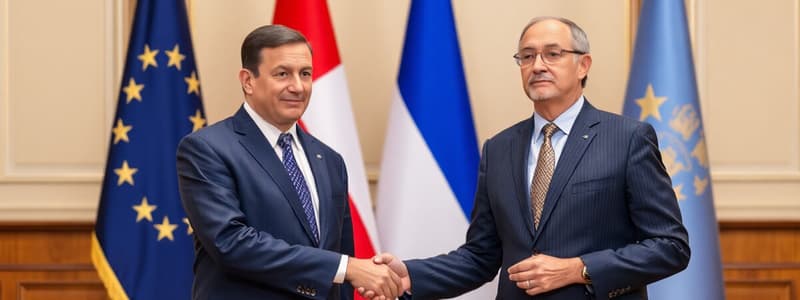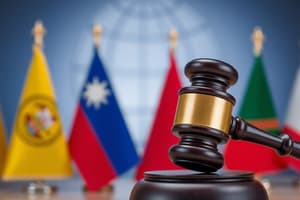Podcast
Questions and Answers
What is diplomatic immunity?
What is diplomatic immunity?
A privilege under which diplomats' activities fall outside the jurisdiction of the host country's national courts.
What is diplomatic recognition?
What is diplomatic recognition?
The process by which the status of embassies and that of an ambassador as an official state representative are explicitly defined.
Breaking diplomatic relations involves:
Breaking diplomatic relations involves:
- Withdrawing one's diplomats from a state and expelling that state's diplomats from one's own country. (correct)
- Recalling ambassadors home for "consultations" for a period of time.
- Imposing sanctions on a country.
- Sending a formal complaint to the other government's ambassador in its own capital city.
The Just-War Doctrine argues that the only permissible use of military force is in response to aggression.
The Just-War Doctrine argues that the only permissible use of military force is in response to aggression.
The Just-War Doctrine differentiates between "just wars" (legal) and "wars of aggression" (illegal).
The Just-War Doctrine differentiates between "just wars" (legal) and "wars of aggression" (illegal).
What is the Responsibility to Protect (R2P) principle?
What is the Responsibility to Protect (R2P) principle?
What are human rights?
What are human rights?
What are war crimes?
What are war crimes?
What are crimes against humanity?
What are crimes against humanity?
Which of these is NOT considered a human rights violation under international law?
Which of these is NOT considered a human rights violation under international law?
The International Committee of the Red Cross (ICRC) facilitates communication and practical support for prisoners of war (POWs).
The International Committee of the Red Cross (ICRC) facilitates communication and practical support for prisoners of war (POWs).
The U.S. has ratified the International Criminal Court (ICC) treaty.
The U.S. has ratified the International Criminal Court (ICC) treaty.
What is the purpose of the International Criminal Court (ICC)?
What is the purpose of the International Criminal Court (ICC)?
Military force is a necessary and acceptable method to address human rights violations under certain circumstances.
Military force is a necessary and acceptable method to address human rights violations under certain circumstances.
Which of these is NOT a key feature of the modern international human rights framework?
Which of these is NOT a key feature of the modern international human rights framework?
The laws of war apply to private military companies.
The laws of war apply to private military companies.
The laws of war require combatants to wear uniforms to clearly distinguish them from civilians.
The laws of war require combatants to wear uniforms to clearly distinguish them from civilians.
The modern international law framework has fully addressed the challenges posed by irregular warfare and the blurring lines between combatants and civilians.
The modern international law framework has fully addressed the challenges posed by irregular warfare and the blurring lines between combatants and civilians.
Flashcards
Diplomatic Recognition
Diplomatic Recognition
The process by which the status of embassies and ambassadors as official state representatives are explicitly defined. It's when countries acknowledge each other's representatives.
Diplomatic Immunity
Diplomatic Immunity
A privilege under which diplomats' activities fall outside the jurisdiction of the host country's national courts. They are protected from the host country's laws.
What is a diplomatic pouch?
What is a diplomatic pouch?
A package sent between an embassy and its home country. It has the home country's territoriality and can't be opened by the host country.
Interests Section
Interests Section
Signup and view all the flashcards
Just Wars
Just Wars
Signup and view all the flashcards
What is aggression in international law?
What is aggression in international law?
Signup and view all the flashcards
Human Rights
Human Rights
Signup and view all the flashcards
Civil-Political Rights
Civil-Political Rights
Signup and view all the flashcards
Economic-Social Rights
Economic-Social Rights
Signup and view all the flashcards
Universal Declaration of Human Rights (UDHR)
Universal Declaration of Human Rights (UDHR)
Signup and view all the flashcards
International Covenant on Civil and Political Rights (CCPR)
International Covenant on Civil and Political Rights (CCPR)
Signup and view all the flashcards
International Covenant on Economic, Social and Cultural Rights (CESCR)
International Covenant on Economic, Social and Cultural Rights (CESCR)
Signup and view all the flashcards
International Convention on the Elimination of All Forms of Racial Discrimination (CERD)
International Convention on the Elimination of All Forms of Racial Discrimination (CERD)
Signup and view all the flashcards
Convention on the Elimination of All Forms of Discrimination Against Women (CEDAW)
Convention on the Elimination of All Forms of Discrimination Against Women (CEDAW)
Signup and view all the flashcards
Convention Against Torture
Convention Against Torture
Signup and view all the flashcards
Convention on the Rights of the Child (CRC)
Convention on the Rights of the Child (CRC)
Signup and view all the flashcards
International Convention on the Protection of the Rights of All Migrant Workers and Members of Their Families (CMW)
International Convention on the Protection of the Rights of All Migrant Workers and Members of Their Families (CMW)
Signup and view all the flashcards
Convention on the Rights of Persons with Disabilities (CRPD)
Convention on the Rights of Persons with Disabilities (CRPD)
Signup and view all the flashcards
International Convention for the Protection of All Persons from Enforced Disappearance (CPED)
International Convention for the Protection of All Persons from Enforced Disappearance (CPED)
Signup and view all the flashcards
Responsibility to Protect (R2P)
Responsibility to Protect (R2P)
Signup and view all the flashcards
War Crimes
War Crimes
Signup and view all the flashcards
Crimes Against Humanity
Crimes Against Humanity
Signup and view all the flashcards
International Criminal Court (ICC)
International Criminal Court (ICC)
Signup and view all the flashcards
Amnesty International
Amnesty International
Signup and view all the flashcards
International Committee of the Red Cross (ICRC)
International Committee of the Red Cross (ICRC)
Signup and view all the flashcards
Prisoners of War (POWs)
Prisoners of War (POWs)
Signup and view all the flashcards
What is the main principle of the laws of war?
What is the main principle of the laws of war?
Signup and view all the flashcards
What is a key challenge in upholding the laws of war in modern conflicts?
What is a key challenge in upholding the laws of war in modern conflicts?
Signup and view all the flashcards
What is the significance of the freedom of the seas in international law?
What is the significance of the freedom of the seas in international law?
Signup and view all the flashcards
How did the U.S. influence the evolution of international law in the 20th century?
How did the U.S. influence the evolution of international law in the 20th century?
Signup and view all the flashcards
Study Notes
Laws of Diplomacy and Sovereignty
- International law emphasizes respect for diplomats' rights, establishing detailed, universal standards of behavior.
- Diplomacy is vital in all state relations (except during all-out war).
- Historically, harming messengers was common; now, it's universally condemned.
- Embassies and ambassadors have specific rights and are officially recognized through diplomatic recognition.
- Host countries cannot enforce their laws within embassies.
- Embassies often provide refuge for dissidents fleeing their governments.
- In 1979, Iranian students seized the U.S. embassy in Tehran, highlighting the sanctity of embassies.
- Diplomats have immunity outside embassy grounds, including from host country courts.
- Some countries restrict diplomat movement whilst others allow it freely.
- Host countries can revoke a diplomat's accreditation.
- Countries can pressure other countries to lift diplomatic immunity for prosecution.
- Diplomatic pouches are used for communication between embassies and their home countries.
- They enjoy territoriality; host countries cannot open them.
Diplomatic Immunity
-
Diplomats are protected from host country legal jurisdiction.
-
Unpaid tickets for diplomats can cost millions of dollars, specifically in New York City.
-
The US has taken the right to revoke driving licenses.
Just-War Doctrine
- International law differentiates between just wars (legal) and wars of aggression (illegal).
- Just wars are legal conflicts.
- The UN Charter prohibits international aggression.
- Just-war doctrine is based on centuries-old religious writings and is an important aspect of international norms.
- Aggression involves state sovereignty violation.
- The only permissible use of force is in response to aggression.
- It prohibits war motivated by changing governance or policies.
- Just intent is needed for a just war; an aggressive war motivated by non-justified motives (e.g., oil).
Human Rights
- Human rights are the rights of all people against abuses.
- Individual rights can conflict with state sovereignty.
- Human rights are considered universal.
- Human rights recognition have religious and secular (political philosophy) roots.
- Universal standards and local traditions can clash; a primary tension in human rights discussions.
- Rights are typically divided into civil-political and economic-social types.
Human Rights Institutions and Conventions
- The Universal Declaration of Human Rights (UDHR) is a core international document, establishing international norms.
- It is not considered binding international law itself.
- Nine legally-binding treaties detail human rights protections, complementing the UDHR.
- These treaties focus on civil-political rights (freedoms) and economic-social rights (provision of things).
- Regional organizations (e.g., EU) and international bodies collaborate to protect human rights.
U.S. Public Opinion and Human Rights
- Public opinion on human rights is variable but often skeptical of intervention in other countries.
- Support generally increases when genocide or similar severe human rights violations are discussed, but less on less severe conflicts.
- The United States has not ratified all human rights treaties.
- Support exists for using sanctions as a response to human rights violations.
War Crimes and International Criminal Court (ICC)
- Large-scale abuses during warfare are considered war crimes.
- International norms and treaties apply during wartime; implementing them can be difficult.
- The post-WWII Nuremberg trials laid groundwork for addressing war crimes.
- International Criminal Court (ICC) was formed to try individuals accused of war crimes and crimes against humanity.
- The ICC has the power to prosecute even if crimes were committed in non-signatory nations.
Laws of War
- International law limits states' rights in war, focusing on combatants.
- Targeting civilians is illegal.
- Military force must be proportional to the objective.
- The rise of private military forces has challenged international laws.
- The use of uniforms and badges distinguishes combatants from civilians.
- Declarations of war are uncommon, making legal application difficult in some modern conflicts.
Studying That Suits You
Use AI to generate personalized quizzes and flashcards to suit your learning preferences.




